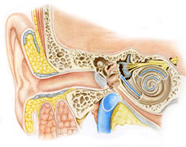Ear Infections

What is an ear infection?
An ear infection is a bacterial infection in the middle ear, which usually occurs after a cold. Colds can cause fluid to build up behind the eardrum which can then cause your Eustachian tubes (the channel between the middle ear and the back of the throat) to get blocked. This allows bacteria to accumulate in the middle ear, and can lead to an infection, swelling of the eardrum, and increased pressure causing pain in the ear. Most babies have at least one ear infection by the time they are three. If your baby has had more than a few, don’t worry, they are very common in babies and small children. This is because, before the age of three their Eustachian tubes are short, fairly horizontal and more narrow than an adult’s, which are longer and more vertical. This helps germs to get through from the throat to the middle ear and makes it easier for fluid to build up.
Signs to look for:
- unwillingness to lie flat
- crying and screaming
- thick and coloured nasal secretions
- fluid draining from the ears
- fluid draining from the eyes
- ear tugging
- low grade fever (37°C-37.5°C)
- cold symptoms-keep in mind that ear infections are almost always preceded by a cold. Often a clear runny nose will turn yellow or green before an ear infection sets in
- fussiness during day or night
- complaining of ear pain and hearing loss
- night waking
How are ear infections treated?
Most ear infections clear up on their own in four to seven days. If you choose to let the infection clear up on its own, do everything you can to make your baby comfortable.
- Treat your baby’s fever and ear pain with anaesthetic ear drops, acetaminophen or ibuprofen
- Elevating your baby’s head by placing something under the head of his mattress at night may help to alleviate pain and discomfort.
- Apply a warm compress to the ear.
- Put several drops of warm olive oil into the ear. If you see any fluid or pus draining out of the ear DO NOT put anything into the ear.
If you choose to use antibiotics prescribed by your doctor to treat the infection they will help to kill the bacteria causing the infection and will also help your child to feel better quickly.
- A seven-day course is the most common prescription.
- Amoxicillin is the standard treatment recommended by doctors. This pink medication usually works well, tastes good, is affordable and will not likely irritate a baby’s digestive system.
- Even though antibiotics usually start to work within two days it is important that you finish the course of medication.
- If you do not see signs of your child improving within the first two days of treatment contact your doctor. It could be that a stronger antibiotic may be necessary.
If your child has a cold along with his ear infection, his cold symptoms will not go away with a treatment of antibiotics. Colds usually take anywhere from three to 14 days to disappear. If you’re baby is under two months of age make sure you visit your doctor before administering any kind of treatment. Always follow up with your doctor even if all symptoms disappear to ensure that swelling goes down and the fluid is draining.
Are ear infections contagious?
Ear infections are not contagious, however a cold can spread among babies and children very easily which can then lead to ear infections.
Seven steps to preventing ear infections:
Here are some ways to prevent or lessen the frequency and severity of your child’s ear infections:
- Breastfeeding lowers your child’s chances of getting ear infections.
- Feed your baby upright. Bottle-feeding lying down can cause the milk to irritate the Eustachian tube.
- Use steam, saline nose drops, and suctioning to keep the nose clear at the start of a cold and to help alleviate a runny nose.
- Keep your baby away from cigarette smoke as it can irritate his nasal passage.
- Boost your child’s immune system by including more raw fruits and vegetables in her diet.
- Minimize contact with people who have cold symptoms
- Most importantly: wash your hands and your baby’s hands regularly.



